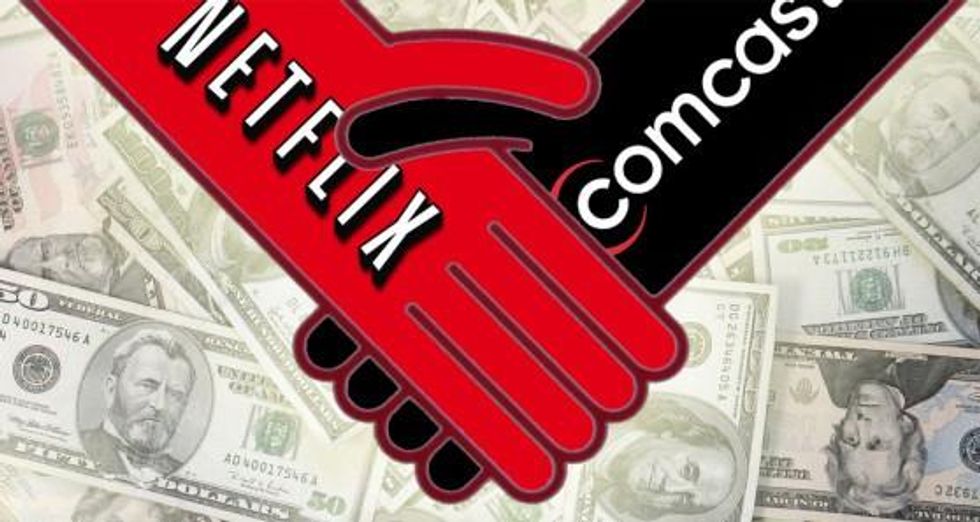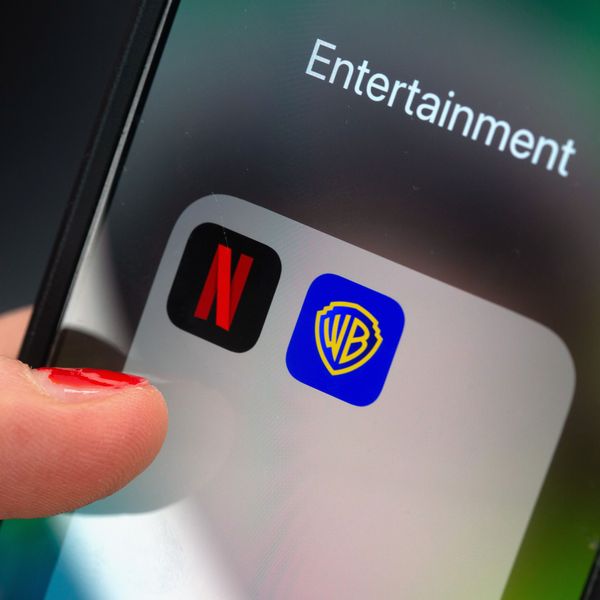Secretive Netflix-Comcast Deal Destroys Promise of Net Neutrality
Arrangement allows Comcast to charge Netflix in exchange for preferential access to its network, undermining key 'net neutrality' principle

Announced on Sunday, the deal will give Netflix direct access to Comcast delivery networks by side-stepping third-party delivery systems that others are forced to use. In effect, the arrangement will speed up Netflix streaming, but only because Netflix can afford to pay the fee that Comcast has now set.
That situation, in which one company can make an exclusive deal with an ISP in order to receive special treatment is a fundamental betrayal of the concept known as 'net neutrality,' in which all online content is given equal treatment across the internet.
As Eric Blattberg describes at VentureBeat:
Whatever Netflix is paying Comcast, the multiyear deal could force Netflix to cough up money to other major broadband providers for similar performance guarantees. Streaming quality has suffered in recent months, especially for Comcast and Verizon customers.
Netflix was pushing Comcast to connect to its servers without compensation, but the broadband provider refused to take on the heavy traffic load free of charge. After seeing average speeds to Comcast customers drop as much as 27 percent during peak hours since October, Netflix buckled and agreed to pay.
John Bergmayer, a senior staff attorney at the advocacy group Public Knowledge, said the secrecy of the Comcast-Netflix deal is one of its essential problems.
"No one on the outside knows what is happening in this market," Bergmayer said. What is clear, however, is "that residential ISPs should be in the business of charging their users for access the Internet, not of charging the rest of the Internet for access to their users. This ensures that they are putting the needs of their users first."
The new development is especially troubling in the context of Comcast's recent announcement to purchase Time Warner cable, a merger that, if approved, would make Comcast the single dominant cable company in the nation with a full one-third of market share.
"One way to prevent competitive problems from arising, and to reduce the need for future regulation, is to prevent ISPs from holding other networks hostage," Bergmayer said. "This raises concerns in light of the proposed Comcast/Time Warner Cable merger."
And Matt Wood, policy director at Free Press, said when it comes to net neutrality and preserving the principles of a fair and open internet, size does matter.
As Wood told the Washington Post: "Only a giant like Netflix could afford to withstand a protracted battle like this, and it may have just surrendered more than it would have if ISPs weren't allowed to abuse their gatekeeper status."
________________________________________________
An Urgent Message From Our Co-Founder
Dear Common Dreams reader, The U.S. is on a fast track to authoritarianism like nothing I've ever seen. Meanwhile, corporate news outlets are utterly capitulating to Trump, twisting their coverage to avoid drawing his ire while lining up to stuff cash in his pockets. That's why I believe that Common Dreams is doing the best and most consequential reporting that we've ever done. Our small but mighty team is a progressive reporting powerhouse, covering the news every day that the corporate media never will. Our mission has always been simple: To inform. To inspire. And to ignite change for the common good. Now here's the key piece that I want all our readers to understand: None of this would be possible without your financial support. That's not just some fundraising cliche. It's the absolute and literal truth. We don't accept corporate advertising and never will. We don't have a paywall because we don't think people should be blocked from critical news based on their ability to pay. Everything we do is funded by the donations of readers like you. Will you donate now to help power the nonprofit, independent reporting of Common Dreams? Thank you for being a vital member of our community. Together, we can keep independent journalism alive when it’s needed most. - Craig Brown, Co-founder |

Announced on Sunday, the deal will give Netflix direct access to Comcast delivery networks by side-stepping third-party delivery systems that others are forced to use. In effect, the arrangement will speed up Netflix streaming, but only because Netflix can afford to pay the fee that Comcast has now set.
That situation, in which one company can make an exclusive deal with an ISP in order to receive special treatment is a fundamental betrayal of the concept known as 'net neutrality,' in which all online content is given equal treatment across the internet.
As Eric Blattberg describes at VentureBeat:
Whatever Netflix is paying Comcast, the multiyear deal could force Netflix to cough up money to other major broadband providers for similar performance guarantees. Streaming quality has suffered in recent months, especially for Comcast and Verizon customers.
Netflix was pushing Comcast to connect to its servers without compensation, but the broadband provider refused to take on the heavy traffic load free of charge. After seeing average speeds to Comcast customers drop as much as 27 percent during peak hours since October, Netflix buckled and agreed to pay.
John Bergmayer, a senior staff attorney at the advocacy group Public Knowledge, said the secrecy of the Comcast-Netflix deal is one of its essential problems.
"No one on the outside knows what is happening in this market," Bergmayer said. What is clear, however, is "that residential ISPs should be in the business of charging their users for access the Internet, not of charging the rest of the Internet for access to their users. This ensures that they are putting the needs of their users first."
The new development is especially troubling in the context of Comcast's recent announcement to purchase Time Warner cable, a merger that, if approved, would make Comcast the single dominant cable company in the nation with a full one-third of market share.
"One way to prevent competitive problems from arising, and to reduce the need for future regulation, is to prevent ISPs from holding other networks hostage," Bergmayer said. "This raises concerns in light of the proposed Comcast/Time Warner Cable merger."
And Matt Wood, policy director at Free Press, said when it comes to net neutrality and preserving the principles of a fair and open internet, size does matter.
As Wood told the Washington Post: "Only a giant like Netflix could afford to withstand a protracted battle like this, and it may have just surrendered more than it would have if ISPs weren't allowed to abuse their gatekeeper status."
________________________________________________

Announced on Sunday, the deal will give Netflix direct access to Comcast delivery networks by side-stepping third-party delivery systems that others are forced to use. In effect, the arrangement will speed up Netflix streaming, but only because Netflix can afford to pay the fee that Comcast has now set.
That situation, in which one company can make an exclusive deal with an ISP in order to receive special treatment is a fundamental betrayal of the concept known as 'net neutrality,' in which all online content is given equal treatment across the internet.
As Eric Blattberg describes at VentureBeat:
Whatever Netflix is paying Comcast, the multiyear deal could force Netflix to cough up money to other major broadband providers for similar performance guarantees. Streaming quality has suffered in recent months, especially for Comcast and Verizon customers.
Netflix was pushing Comcast to connect to its servers without compensation, but the broadband provider refused to take on the heavy traffic load free of charge. After seeing average speeds to Comcast customers drop as much as 27 percent during peak hours since October, Netflix buckled and agreed to pay.
John Bergmayer, a senior staff attorney at the advocacy group Public Knowledge, said the secrecy of the Comcast-Netflix deal is one of its essential problems.
"No one on the outside knows what is happening in this market," Bergmayer said. What is clear, however, is "that residential ISPs should be in the business of charging their users for access the Internet, not of charging the rest of the Internet for access to their users. This ensures that they are putting the needs of their users first."
The new development is especially troubling in the context of Comcast's recent announcement to purchase Time Warner cable, a merger that, if approved, would make Comcast the single dominant cable company in the nation with a full one-third of market share.
"One way to prevent competitive problems from arising, and to reduce the need for future regulation, is to prevent ISPs from holding other networks hostage," Bergmayer said. "This raises concerns in light of the proposed Comcast/Time Warner Cable merger."
And Matt Wood, policy director at Free Press, said when it comes to net neutrality and preserving the principles of a fair and open internet, size does matter.
As Wood told the Washington Post: "Only a giant like Netflix could afford to withstand a protracted battle like this, and it may have just surrendered more than it would have if ISPs weren't allowed to abuse their gatekeeper status."
________________________________________________

